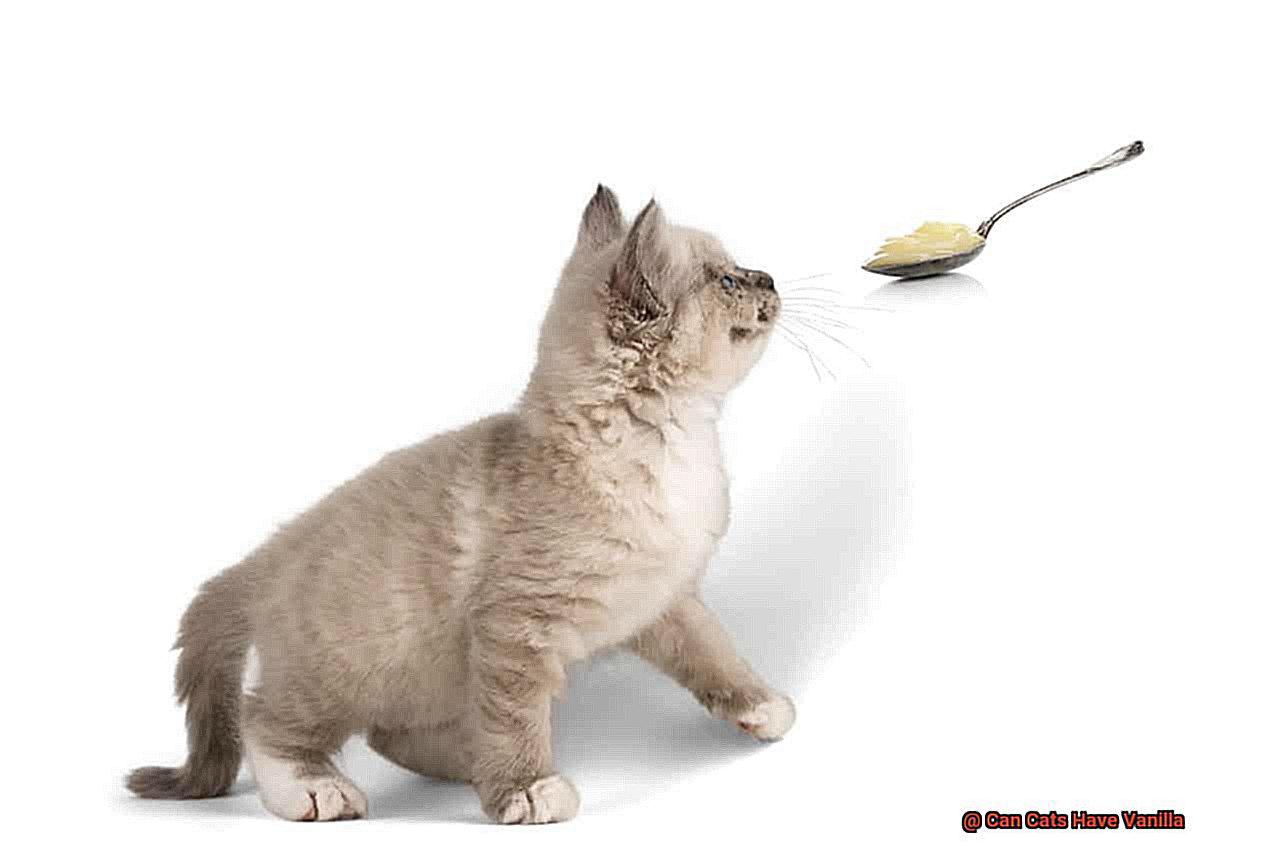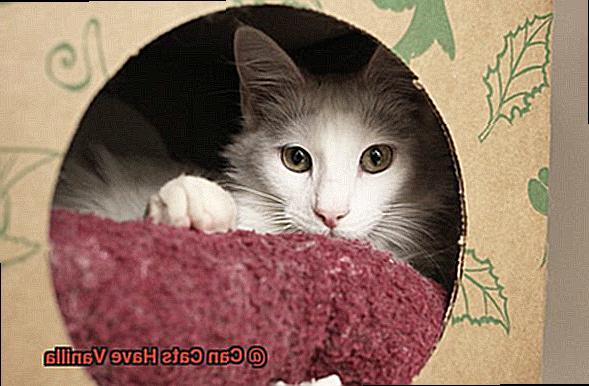Do cats enjoy the sweet taste of vanilla? Many cat owners ask this question, and we’re here to answer it. Unfortunately, the short answer is no.
Vanilla may be tempting to cats, but it can cause serious health problems due to the sugar and other ingredients. But don’t worry.

There are plenty of safe alternatives that your cat will love just as much. Let’s explore why cats shouldn’t have vanilla and what alternative treats they can substitute with instead.
We’ll also discuss how giving cats vanilla can be harmful to them and how you can keep them healthy while still treating them every now and then. First off, it’s important to know why cats should not have vanilla.
Vanilla usually contains sugar, which is harmful to cats because their bodies aren’t meant to process large amounts of it like ours do. Too much sugar can lead to obesity, diabetes, dental problems, and more.
In addition, some brands of vanilla extract contain alcohol which can be dangerous if swallowed in large amounts by cats.
Natural desserts such as cooked meat or fish, certain fruits or vegetables (depending on your cat’s preferences), plain yogurt or low-fat cheese are all healthier options than sugary treats like ice cream or cakes.
Can Cats Have Vanilla Extract?

The answer to the question of whether cats can have vanilla extract is a bit more complicated than a simple yes or no.
Vanilla extract derived from vanilla beans is generally safe for cats in small amounts, however, it’s important to note that many commercial varieties contain alcohol, which can be harmful for cats if consumed in large quantities.
If you’re considering giving your cat a taste of the sweet aroma and flavor of vanilla, it’s best to stick with pure vanilla beans or an alcohol-free extract.
Ultimately, it’s always best to consult with your veterinarian before adding new foods to your cat’s diet.
Can Cats Have Vanilla-Flavored Products?
When it comes to feeding your feline friend vanilla-flavored products, there are a few things to keep in mind.
Vanilla itself is not toxic to cats, but some of the ingredients in these products can be harmful. For instance, vanilla pudding contains milk and sugar which can cause digestive issues for cats who are lactose intolerant or have a sensitive stomach.
Vanilla ice cream also contains dairy and added sugar which is not a natural part of a cat’s diet and can lead to weight gain or other health problems over time. Vanilla beans should be avoided as they may cause digestive problems or blockages if ingested.
Vanilla oat milk and vanilla almond milk can be safe for cats in small amounts, but it is essential to check the ingredient lists carefully as some brands may contain added sugars or other potentially harmful ingredients.
Lastly, although vanilla cake may seem like a tasty treat for your feline friend, it is usually high in sugar and other ingredients that are not part of a cat’s natural diet and may result in health issues down the road.
It is important to remember moderation when treating your furry friend with something sweet.
Can Cats Have Pure Vanilla Beans?
Cats may be tempted to indulge in the sweet and fragrant aroma of pure vanilla beans, but it is not advised to give them as a treat.
While pure vanilla beans are not toxic to cats, they contain no nutritional value and can cause stomach upset, diarrhea, or vomiting if consumed in large amounts. For a healthier snack option that still satisfies their sweet tooth, try small amounts of vanilla oat or almond milk.
When treating your feline friend to something sweet, be sure to practice moderation and consult with a veterinarian before introducing any new food into their diet.
Safety Tips When Feeding Vanilla to Cats
Vanilla extract is perfectly safe for cats to consume, but there are some safety tips to keep in mind when feeding vanilla to your feline friend.
Here are some essential safety tips for feeding vanilla to cats:
Use pure vanilla extract
When adding a hint of vanilla to your cat’s food or treats, make sure to use only pure vanilla extract that does not contain any artificial sweeteners, colors, or additives. These ingredients can be toxic and may lead to digestive problems or allergic reactions.
Monitor portion sizes
While vanilla extract is generally safe for cats, it is recommended to use it in small amounts. Too much can upset their stomach and cause vomiting or diarrhea. Start with a small amount, and gradually increase the dosage if your cat shows no adverse reactions.
Avoid feeding vanilla-flavored products
Commercially available vanilla products such as ice cream, cake, or pudding contain high amounts of sugar and artificial additives that can be harmful to cats. Even if they show interest in these treats, it’s best to avoid feeding them and stick to cat-friendly snacks instead.
Watch for signs of allergies
Your cat may be allergic to vanilla or other ingredients present in vanilla products. Signs of an allergic reaction include itching, redness, and swelling of the skin, vomiting, diarrhea, or difficulty breathing. If you notice any of these symptoms after giving your cat a treat that contained vanilla extract or beans, seek veterinary care immediately.
Consult with your veterinarian
Before introducing any new foods into your cat’s diet – including plain old pure vanilla – it’s always a good idea to consult with your veterinarian first. Your doctor will be able to provide you with a more tailored approach based on their individual health and dietary needs so you know exactly what is safe for them (and what isn’t.).
When it comes down to it, as long as you follow the safety tips listed above with caution and mindfulness when feeding your furry friend a little bit of plain old pure vanilla every now and then as an occasional treat won’t hurt them.
Potential Health Benefits of Vanilla for Cats

Vanilla is an unlikely but powerful health ally for cats.
While it’s best known for its sweet and savory flavor, it can also provide a range of health benefits. For starters, vanilla has anti-inflammatory properties that can help cats with inflammatory conditions such as arthritis.
It also contains antibacterial compounds that may help fight off bacterial infections and antioxidants to bolster the immune system and protect against various diseases and illnesses. But it doesn’t stop there – vanilla has a calming effect on the nervous system, which can be beneficial for cats who are easily stressed or have anxiety issues.
Therefore, always consult with your veterinarian before introducing anything new into your pet’s diet.
What to Do if Your Cat Eats Too Much Vanilla
It’s no secret that cats love to explore their environment, but their curiosity can sometimes lead them astray. If your cat has been snacking on something they shouldn’t have, such as vanilla, it’s important to take action quickly and seek veterinary assistance if necessary.
When it comes to cats and vanilla, the real concern lies in the amount of vanilla they consume. Vanilla itself is not toxic to cats, but excessive consumption can lead to some unpleasant side effects.
If your cat has eaten too much vanilla, you should watch for any unusual behavior or symptoms such as vomiting, diarrhea, or lethargy. These are all signs that your cat is experiencing some discomfort or distress. You will need to contact your veterinarian if you notice any of these symptoms.
In the meantime, you can help your cat by offering them some fresh water to drink. This will help to flush the vanilla out of their system and prevent dehydration. You could also distract your cat by giving them something to play with or grooming them to keep them calm.
It’s important to remember not to induce vomiting in your cat unless advised to do so by your veterinarian. While this may seem like a logical solution, vomiting can be dangerous for cats, especially if they have ingested a large amount of vanilla.
So, if your cat eats too much vanilla, the best course of action is to monitor their behavior and contact your veterinarian if necessary. Providing fresh water and trying to distract your cat can also help ease any discomfort they may be experiencing. Additionally, make sure all vanilla products are out of reach of your cats at all times; even small amounts of vanilla can be harmful for our feline friends.
sk0OOUA-4V8″ >
Alternatives to Vanilla for Cats
If your beloved feline enjoys the occasional indulgence of vanilla, don’t worry – it is generally safe for cats in small amounts.
However, if your cat is allergic or simply uninterested, you’ll need to find some alternatives. Luckily, there are plenty of tasty options that cats will love.

Catnip is a favorite among cats – its mild, minty flavor is sure to please any palate. Cat grass is another great choice – not only does it provide a nutritious snack and help with digestive issues, but it’s also an excellent source of fiber.
Additionally, cats can enjoy small amounts of other herbs such as parsley, thyme and rosemary. And if you’re looking for something special, why not try other flavors of ice cream like strawberry or coconut?
Remember that although cats can enjoy certain human foods in moderation, their digestive systems are different from ours.
Also Read: Can Cats Eat Vanilla Pudding? – 21Cats.org
Conclusion
In conclusion, cats should not have vanilla. While pure vanilla beans are generally safe for cats in small amounts, they do not provide any nutritional value and can cause stomach upset or diarrhea if consumed in large doses.
Additionally, many commercial versions of vanilla extract contain alcohol, which can be harmful to cats if ingested in large amounts.
Vanilla-flavored products such as ice cream, cake, or pudding are also high in sugar and other ingredients that are not part of a cat’s natural diet and may result in health issues down the road.
If you want to treat your feline friend to something sweet, practice moderation and consult with a veterinarian before introducing any new foods into their diet.
Be sure to watch out for signs of allergies, such as itching, redness, or difficulty breathing after giving your cat a treat containing vanilla extract or beans. Fortunately, there are plenty of healthy alternatives that your cat will love just as much – if not more – than natural desserts.







